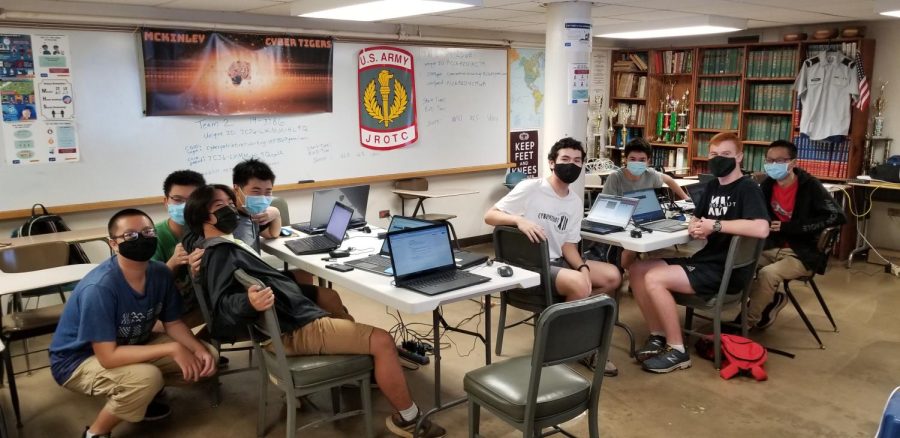McKinley Cyber Tigers Win First Ever State Level Award
From left to right, Haoshen Zheng (11), Lawrence Zheng (11), Gene Yamashita (11), Joshua Chow (11), Lian Fouse (11), Ryan Vanairsdale (12), Nolan Haisler (11), Jia Jun Li (11)
February 15, 2022
The 2021-2022 McKinley Cyber Tigers team broke new ground this year when it received the school’s first State-level award in the CyberPatriots national cybersecurity competition. The Cyber Tigers finished second in the state and were among the country’s top 25 percent in the Platinum Open division, qualifying the team for the national semi-finals round. After breaking into the Platinum division during the 2020-2021 season, the Cyber Tigers were able to sustain their momentum and reach new heights this year while overcoming obstacles along the way.
“We’ve never gotten to this point ever,” said Cyber Tigers mentor and McKinley High School alumni Mark Munar. Munar, who has been the mentor since 2011 when the team was formed, recalled a time when the Cyber Tigers did not have their own computers and none of the students had any experience with cybersecurity.
The Cyber Tigers have come a long way since then, but building the necessary technical skills for the competition requires significant time and dedication from the team each year. With students continually graduating and new students coming on board, the team must review fundamentals and bolster higher-level technical skills simultaneously if they want to succeed. Moreover, the Air Force Association that sponsors the national cyber defense competition continues to raise the bar.
According to Munar, the competition gets tougher every year.
“It’s ridiculous how sophisticated the challenges are now,” Munar said.
The Cyber Tigers must find and fix a wide variety of security vulnerabilities in computers, like maliciously planted backdoors that a cybercriminal can exploit to take over a network. The team has six hours to solve as many issues as it can. One of the reasons the competition keeps getting harder every year is that hackers keep finding more and more ways to attack computer systems.
“There are a lot of threats out there,” said Cyber Tigers club adviser and JROTC teacher LTC(R) Manuel Pulido. “Our society is moving to everything over the internet, like with the internet of things, so we must know how to operate in that type of environment.”
As society becomes increasingly digital, cybercriminals seek new ways to exploit every vulnerability. This is why the U.S. Bureau of Labor Statistics projects that the employment of information security analysts will grow by 33% over the next decade, far exceeding job growth in most other professions.
Despite how demanding the CyberPatriots competition has become, Munar said he remains confident that anyone who wants to can learn and become adept in cybersecurity. A good example of this is senior Ryan Vanairsdale, who joined the team as a freshman with little experience in cybersecurity, but said he feels he has learned a lot since then.
“From my four years with the Cyber Tigers, I gained an understanding of the internet, networks, and how computers function,” said Vanairsdale.
The benefits of the training went beyond the specific skills necessary for the competition, he said, adding that “the things I’ve learned in Cyber Tigers have made me more confident and informed when I do anything related to computers.”
Training for the CyberPatriots competition involves more than just technical skill development. CyberPatriots is a team competition, so teammates need to coordinate with each other to best use each others’ strengths and manage time effectively. It is structured to closely simulate what it would be like if you were part of a security firm and were asked to investigate and protect a real business’ network.
“You’re learning systems analysis, project management, information management, prioritizing actions that you’re taking – those skills cross boundaries into any organization,” said Pulido.
Whether or not the Cyber Tigers will be able to sustain their forward momentum in the CyberPatriots competition will depend on continuing support from mentors and coaches as well as dedicated participation by McKinley students.
The Cyber Tigers practice every Thursday after school in the JROTC basement in A Building throughout the school year. If you are interested you are welcome to stop by a practice or check the student activities web page for more information.




